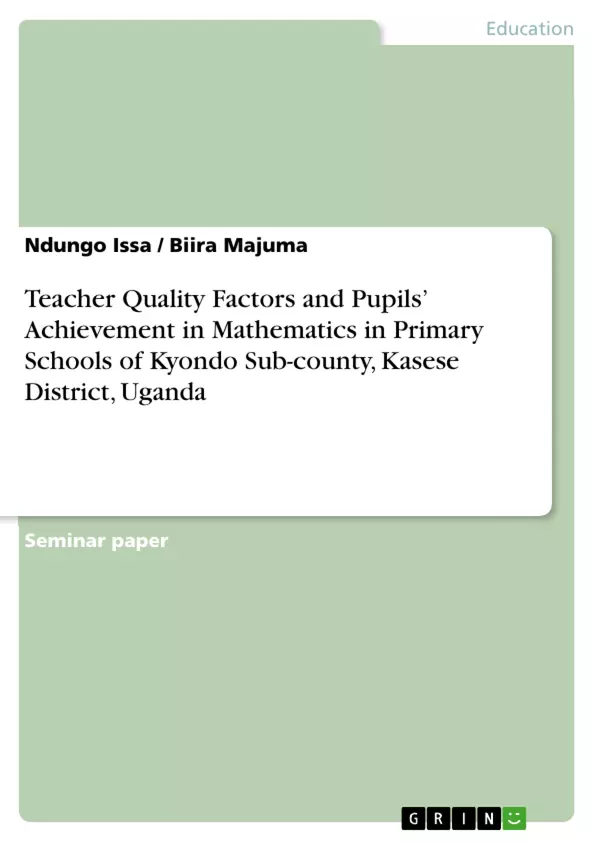According to the National Assessment Program in Education (NAPE) report (2015), pupils’ proficiency (achievement) level in mathematics (numeracy) is low at primary six. Also teachers are essential to pupils’ achievement in mathematics; their characteristics such as commitment, qualification, teaching abilities are significant to pupils’ levels of achievement. The success or failure of any academic program depends largely on the teacher ability to deliver which is a function of teachers’ qualification, experience, and commitment. This study examined the teachers’ quality factors that are thought to affect pupils’ achievement in mathematics in primary six.
The study used teachers and pupils, to obtain data, a total of 70 respondents were randomly selected from five primary schools of Kyondo sub-county, Kasese district. Basing on the findings of the study, it was revealed that first, the teachers’ qualification and experience are not significant to pupils’ level of achievement in mathematics. While teachers’ level of commitment is highly significant to the pupils’ level of achievement in mathematics. Therefore the low level of pupils’ achievement in mathematics at primary in Kyondo sub-county is mainly as a result of low levels of teacher commitment to classroom activities.
Inhaltsverzeichnis (Table of Contents)
- Introduction
- Main objective
- Research Hypotheses
- Methods
- Results
- Descriptive statistics for Achievement levels in mathematics at primary six
- Teacher's qualification and experience and level of pupils achievement in mathematics
- Teacher's level of commitment and pupils' level of achievement in mathematics
- Conclusion
- Recommendation to solve the existing problem
- Recommendations for further research
Zielsetzung und Themenschwerpunkte (Objectives and Key Themes)
This study aims to establish the effect of teacher quality factors on the pupils' achievement in mathematics at primary six. The research investigates the relationship between teachers' qualifications, experience, and commitment, and their impact on pupils' performance in mathematics. The study specifically explores whether these teacher quality factors are significant in determining pupils' achievement levels in the subject.
- Teacher quality factors and their impact on pupils' achievement in mathematics
- The role of teacher qualification and experience in relation to pupils' achievement
- The significance of teacher commitment to pupils' performance in mathematics
- Analysis of the relationship between different aspects of teacher commitment and pupils' achievement
- Exploring the implications of the findings for improving pupils' achievement in mathematics in the Kyondo sub-county.
Zusammenfassung der Kapitel (Chapter Summaries)
- Introduction: The study addresses the issue of low pupils' achievement in mathematics in Uganda, specifically focusing on primary schools in the Kyondo sub-county, Kasese district. The context of mathematics as a core subject and the importance of teacher quality factors in influencing pupils' performance are outlined.
- Methods: The study employed a quantitative design with a random sample of 18 mathematics teachers and 52 primary six pupils from five primary schools. A standard mathematics test was used to measure pupils' achievement levels, and a closed-ended questionnaire was used to gather data on teacher quality factors. The analysis involved the use of Pearson correlation measures to test the stated hypotheses.
- Results: The study revealed that teachers' qualification and experience were not significantly correlated with pupils' achievement levels in mathematics. However, teachers' level of commitment demonstrated a highly significant positive correlation with pupils' achievement. This suggests that low levels of teacher commitment to classroom activities may be a major contributor to the low achievement levels observed in mathematics at primary level in Kyondo sub-county.
Schlüsselwörter (Keywords)
The study focuses on teacher quality factors, including qualification, experience, and commitment, as well as their impact on pupils' achievement in mathematics. Key themes explored include the significance of teacher characteristics in shaping student outcomes, the importance of teacher commitment to classroom activities, and the need to address the challenges related to low achievement levels in mathematics education. The study utilizes quantitative research methods and employs statistical analysis to examine the relationships between teacher quality factors and pupil achievement.
Frequently Asked Questions
What factors affect pupils' achievement in mathematics in Uganda?
The study identifies teacher quality factors, particularly teacher commitment, as a major influence on student performance in Kyondo sub-county.
Do teacher qualifications improve math scores?
Surprisingly, the study found that teacher qualifications and years of experience were not significantly correlated with pupils' achievement levels in mathematics.
Why is teacher commitment so important?
High levels of commitment to classroom activities directly correlate with better student results, whereas low commitment leads to poor proficiency at the primary six level.
What was the methodology of the study?
The research used a quantitative design, sampling 70 respondents (teachers and pupils) from five primary schools in the Kasese district.
How can math achievement be improved in Kyondo?
The findings suggest that focusing on increasing teacher commitment to their classroom duties is key to overcoming low numeracy levels.
- Citar trabajo
- Ndungo Issa (Autor), Biira Majuma (Autor), 2018, Teacher Quality Factors and Pupils’ Achievement in Mathematics in Primary Schools of Kyondo Sub-county, Kasese District, Uganda, Múnich, GRIN Verlag, https://www.grin.com/document/428160



